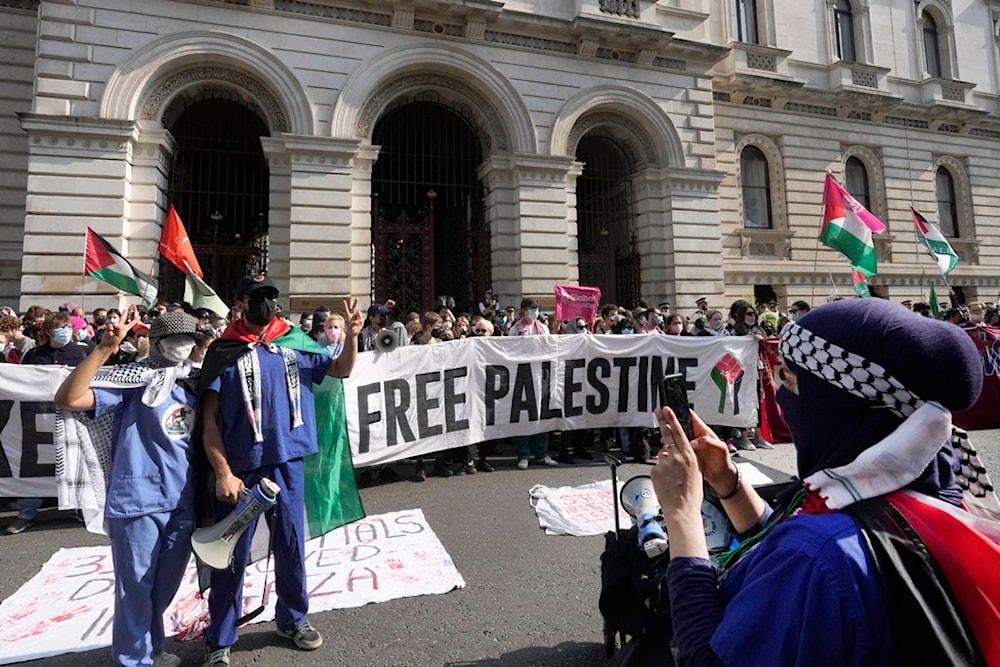Met police raid on Quaker house spurs protests, attracts signatories
Besides the Westminster raid, police have reportedly carried out raids on activists’ homes in London and beyond over their support for Gaza.
-

Workers and trade unionists from Workers for a Free Palestine blockade the Foreign, Commonwealth and Development Office (FCDO) in central London, Wednesday, July 24, 2024 (AP)
In an unprecedented raid, Metropolitan Police officers stormed a Quaker meeting house in Westminster on Thursday, arresting six women attending a gathering of the activist group Youth Demand. The operation, involving more than 20 uniformed officers—some armed with tasers—has been condemned as an “aggressive violation” by the Quakers.
Despite the crackdown, Youth Demand reported a surge in support, with up to 200 new individuals expressing interest in joining their upcoming protests against the Israeli occupation's crimes in Gaza.
The group, which includes young veterans of the Just Stop Oil movement, has vowed to “shut down London” through daily demonstrations starting Tuesday, beginning with a rally at Malet Street, Bloomsbury.
One of the arrested activists, later released without charge, described the shock of the raid. “These are welcome talks run every week, completely open to the public. The police could have just walked in and sat down,” she said.
Instead, officers gathered at the window before forcibly entering. “They burst into a room of women sitting in a circle. In another room, a life-drawing class was taking place—with a model in the middle—and an elderly woman was in the toilet at the time.”
Police raids intensify
Beyond the Westminster raid, police have reportedly carried out raids on activists’ homes in London and beyond, which Youth Demand interprets as a sign of mounting government concern over their growing movement.
Eddie Whittingham, an activist arrested in Exeter, said his detention followed a brief road blockade. “To the best of my knowledge, stepping out into the road for 10 minutes isn’t something you can be preemptively arrested for, yet here we are,” he said. “It’s baffling, but also affirming that the police see young people taking these actions as a serious enough threat to warrant such resources.”
The Metropolitan Police justified the Westminster arrests as a preemptive measure against potential disruptions in the capital. “Youth Demand has stated an intention to ‘shut down’ London over April using tactics including ‘swarming’ and roadblocks,” a police spokesperson said. “While we recognize the right to protest, we have a responsibility to prevent activity that crosses the line into serious disruption and criminality.”
London marches in solidarity with Palestine
On March 15, thousands of protesters swarmed the streets of London, ready to march in solidarity with Palestine.
Banners asking that the UK government cease supporting and equipping the Israeli occupation may be seen in videos from the rally, which pro-Palestine activists have repeatedly made since October 2023.
The Palestine Solidarity Campaign uploaded footage of British MP Jeremy Corbyn and actor Khalid Abdalla participating in the march.
A counter-protest organized by Stop the Hate has gathered at the intersection of Haymarket and Coventry Street, near Piccadilly Circus. Barriers and cops were in place to keep the groups apart as they passed each other. According to authorities, the pro-Palestinian march passed counter-protesters without incident.
UK Met block pro-Palestine march
Back in January, London's Metropolitan Police came under scrutiny for blocking a pro-Palestine rally in front of the BBC headquarters.
Six pro-Palestine groups, which typically organize the national Palestine marches, backed by over 150 high-profile individuals and organizations such as Amnesty International UK, Liberty, and Greenpeace, strongly denounced the Metropolitan's move.
In a joint statement, the collective accused the agency of exploiting public order advantages to shield the BBC from public dissent for its misconduct and false news regarding the ongoing Israeli war on Gaza.
Protest organizers criticized the BBC for failing to adequately represent Palestinian suffering, accusing the broadcaster of pro-Israeli bias. They also consider their marches as a way to hold the BBC accountable.
Organizers claim that despite pre-agreeing to the protest route with police, the Metropolitan Police aimed to block the demonstration, a move they deemed an abuse of public order powers to shield the BBC from scrutiny.

 4 Min Read
4 Min Read










